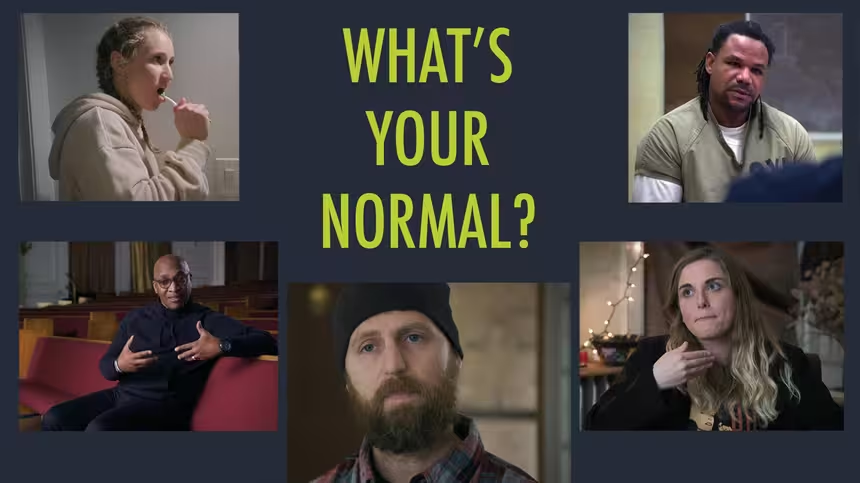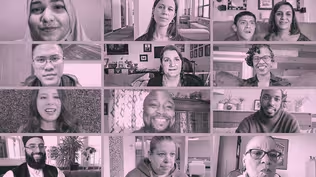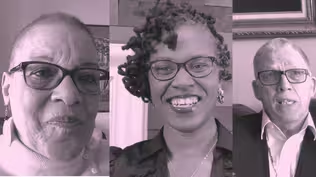
Kelvin Nguyen | Decolonizing Mental Health
Special | 4mVideo has Closed Captions
Kelvin Nguyen unlearns shame and embraces therapy to help himself and others.
When Kelvin Nguyen was dealing with a mental health crisis, his family called the police for help. Mental health isn’t a crime and he wasn’t a criminal. Today, through VietCare, Nguyen educates and counsels others like him to overcome social taboos, discard shame, and seek mental healthcare. With the help of therapy, he is happy to be on this journey of self-realization while helping others.
Problems playing video? | Closed Captioning Feedback
Problems playing video? | Closed Captioning Feedback
Funding for Mysteries of Mental Illness is provided by the Corporation for Public Broadcasting, Johnson & Johnson, the American Psychiatric Association Foundation, and Draper, and through the support of PBS...

Kelvin Nguyen | Decolonizing Mental Health
Special | 4mVideo has Closed Captions
When Kelvin Nguyen was dealing with a mental health crisis, his family called the police for help. Mental health isn’t a crime and he wasn’t a criminal. Today, through VietCare, Nguyen educates and counsels others like him to overcome social taboos, discard shame, and seek mental healthcare. With the help of therapy, he is happy to be on this journey of self-realization while helping others.
Problems playing video? | Closed Captioning Feedback
How to Watch Mysteries of Mental Illness
Mysteries of Mental Illness is available to stream on pbs.org and the free PBS App, available on iPhone, Apple TV, Android TV, Android smartphones, Amazon Fire TV, Amazon Fire Tablet, Roku, Samsung Smart TV, and Vizio.

Join the Campaign
Share your story of dealing with mental illness through textual commentary, a still image, a short-form video — however you feel most comfortable — using the hashtag #MentalHealthPBS on social media.(birds chirping) (intense music) - [Kelvin] I had a knife, and I brought it into my room.
(knocking on door) My family called the police.
(knocking on door) (door shaking) I was having a mental health crisis.
- [Dispatcher] At this time we have you at Lee 3431.
(knocking on door) - Why would the police be called for something that I am suffering for?
Am I a criminal for feeling this way, and having these inclinations of not wanting to live?
(sirens) (feet running up the stairs) That was a very bitter taste about what mental health crisis intervention looks like.
(soft xylophone music) There was a lot of stigma within my household.
And so, when I was in high school, I wasn't actively aware that therapy would be a good benefit for me, because that conversation was never had.
In the Asian American community, there is a lot of resistance for finding care that is, is, I guess, not abrasive to other family members.
And so, saving face is a really big thing.
Especially the culture that I come from.
(soft xylophone music) - When we look at how can we find the best type of care, a lot of times that type of care is passed through word of mouth or recommendation.
And a lot of those types of interactions are not happening because of this social taboo or the mental health stigma of sharing about one's issues, or the issues about their children, to find the best services for them.
It becomes an endeavor that I feel like the parent feels that they have to do themselves, or they can't trust anyone to help them with that.
(soft xylophone music) I went to University of California, Irvine.
I sought out counseling for the first time in my life, now that I had the resources.
So it was through the university's insurance plan that I was able to get services for mental health.
That was that safety net for folks like myself who come from a background of not being able to even seek dental help, or even seek normal health, let alone mental health.
From that experience, I realized how nurturing it can be.
(soft xylophone music) I am currently the board president of Vietcare, which is a grassroots nonprofit addressing a lot of mental health issues, and reducing the stigma within our communities.
We're a 100% volunteer based nonprofit, and every single one who comes out to our events are community members.
And so we're all homegrown.
We're just young, scrappy, and hungry to create change.
(birds chirping) (soft xylophone music) It's been a very great learning experience for myself through mental health.
I wouldn't have been here if it wasn't for my mental health challenges.
It wasn't until I was pushed to my very last moments of crisis that I sought after these resources.
The UC Irvine system for mental health services, we are only allowed to have, I think, 12 weeks of sessions.
That mental health treatment for me stopped then.
Right now, I feel like a lot of my self-care comes from caring about others, but I'm finding that balance.
We're still learning, right?
You know, we're still realizing where we are and where we're going, you know, but yeah.
That's right now.
(soft xylophone music)

- Science and Nature

Explore scientific discoveries on television's most acclaimed science documentary series.

- Science and Nature

Capturing the splendor of the natural world, from the African plains to the Antarctic ice.












Support for PBS provided by:
Funding for Mysteries of Mental Illness is provided by the Corporation for Public Broadcasting, Johnson & Johnson, the American Psychiatric Association Foundation, and Draper, and through the support of PBS...

